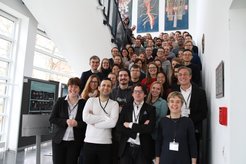Enjoying „Proteins@Interfaces“
On Wednesday, 21st and Thursday 22nd of November more than 80 researchers have met to learn and discuss present challenges, developments and contemporary solutions to problems associated with proteins at interfaces.

In recent years it has turned out that many groups of the Johannes Gutenberg University and the MPI-P are interested in topics associated with protein behavior at interfaces. At many (biological or non-biological) interfaces, proteins fulfill a wide range of biological functions, and life simply would not be possible without coordinated protein/interface interactions. Understanding the role and behavior of proteins at interfaces thus is important for all aspects of life on earth. It currently is a holy grail in protein biochemistry/biophysics to understand the biochemical and physicochemical laws dictating protein-surface interactions, which ultimately will allow controlling and engineering protein structure and functions at interfaces.
Stimulated by the Max Planck Graduate Center (MPGC), many research groups of the Johannes Gutenberg University and the MPI-P have closely interacted and collaborated during the last few years in projects dealing with different aspects of proteins at interfaces. Now, on Wednesday, 21st and Thursday 22nd, interested researchers have met in the Staudinger lecture hall of the MPI-P to learn and discuss present challenges, developments and contemporary solutions to problems associated with proteins at interfaces. During the two days of the PhD school, 16 Faculty members from the MPI-P as well as from the Johannes Gutenberg University (Medicine, Biology and Chemistry) have introduced their respective research interests and their technical repertoire. The purpose of the meeting was not only to train a new generation of young scientist but also to stimulate discussions beyond the borders of a particular research group and to initiate further collaborations. A special emphasis of this PhD school was to give young group leaders the possibility to introduce their research topics and repertoire. With more than 80 participants (of which 50 students, 11 postdocs, and a female participation of 50% both among the presenters and the attendees) and many fruitful discussions after the presentations and during the poster sessions, this first PhD school was a great success, and all the participants really enjoyed this fantastic event. The organizers and participants fully agree that there have to be more events like this in the near future, and group leaders of the Johannes Gutenberg University currently plan together with group leaders of the MPI-P to establish a larger research and training consortium, so that more people can enjoy working on “Proteins@Interfaces”.












